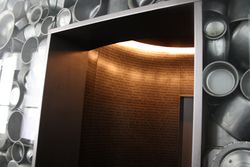Highlights Michał und Julia
Factory Schindler
On the fifth day of our stay in Poland we went to the Oskar Schindler Museum in Cracow.
We both epected the museum to be different from what it actually was.
There were around 30 rooms, displaying the daily life in Cracow during the german occupation from 1939-1945.
Only two to three rooms actually were about Schindler and what he completed in his factory. Both of us expected there to be more detailed information about how Schindler managed to save as many jews as possible.
Still we were pretty happy to learn so much about how life looked like in Cracow before and during the nazis occupation.
For example all the street names were changed to german (like "rynek główny" was changed to "Adolf-Hitler-Platz") and people weren't allowed to use the polish names anymore without risking to be severly punished or even deported to a concentration camp.
Jews had to wear the yellow five-spoke star to be easily spotted in public, weren't allowed to go to the park anymore (or were restrained to special benches) and had to keep to certain areas in public transportation.
Later, when the ghetto of cracow was established (from 03.03.1941 to 14.03.1943), folks started smuggling. Hair dyes were used to cover up grey hair, so the eldely would make it through the selection of the nazis i.e. not having to go to a concentration camp. Sedatives were given to children so they wouldn't reveal the family's hideout by crying out loud when nazis were nearby.
There were 17.000 sufferers of nazi arbitrariness living in a place formerly housing 3.000. It was said that there should be 2 persons for each window in an apartment. There were up to 10 people in one dweling, not necessarily knowing each other.
About 3.000 people who survived the ghetto itself were deported to different concentration camps.
The former room of Schindler's secretary and his own office were located on the upper floor. In Schndler's office there was a beautiful memorial. A huge glas cuboid containing enamel pots and pans with an opening in the middle. When you went inside, there were all the names of all the people Schindler saved written on the wall. Even in this dark era, there were persons brave enough to stand up for their fellow human beings.
In the very end two books were displayed. One was white, listing the ones helping others, doing good. The other one was black, listing the ones betraying and squealing their own crowd. Whether this is right or not, one can only decide by oneself.
© by Michał & Julia


